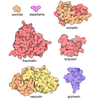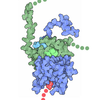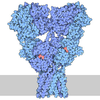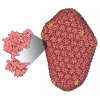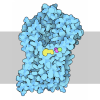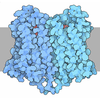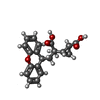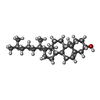[English] 日本語
 Yorodumi
Yorodumi- PDB-8jcy: Cryo-EM structure of mGlu2-mGlu3 heterodimer in presence of LY341... -
+ Open data
Open data
- Basic information
Basic information
| Entry | Database: PDB / ID: 8jcy | |||||||||
|---|---|---|---|---|---|---|---|---|---|---|
| Title | Cryo-EM structure of mGlu2-mGlu3 heterodimer in presence of LY341495, NAM563, and LY2389575 (dimerization mode I) | |||||||||
 Components Components |
| |||||||||
 Keywords Keywords | MEMBRANE PROTEIN / Complex structure / mGlu2-3 heterodimer | |||||||||
| Function / homology |  Function and homology information Function and homology informationpositive regulation of biosynthetic process / positive regulation of multicellular organismal process / regulation of response to drug / group II metabotropic glutamate receptor activity / regulation of phosphatidylinositol 3-kinase/protein kinase B signal transduction / regulation of cellular response to stress / macrolide binding / TORC1 complex / activin receptor binding / regulation of skeletal muscle contraction by regulation of release of sequestered calcium ion ...positive regulation of biosynthetic process / positive regulation of multicellular organismal process / regulation of response to drug / group II metabotropic glutamate receptor activity / regulation of phosphatidylinositol 3-kinase/protein kinase B signal transduction / regulation of cellular response to stress / macrolide binding / TORC1 complex / activin receptor binding / regulation of skeletal muscle contraction by regulation of release of sequestered calcium ion / intracellular glutamate homeostasis / cytoplasmic side of membrane / transforming growth factor beta receptor binding / behavioral response to nicotine / TGFBR1 LBD Mutants in Cancer / type I transforming growth factor beta receptor binding / signaling receptor inhibitor activity / negative regulation of adenylate cyclase activity / negative regulation of activin receptor signaling pathway / G protein-coupled glutamate receptor signaling pathway / heart trabecula formation / I-SMAD binding / Class C/3 (Metabotropic glutamate/pheromone receptors) / glutamate secretion / long-term synaptic depression / regulation of amyloid precursor protein catabolic process / glutamate receptor activity / terminal cisterna / ryanodine receptor complex / regulation of glutamate secretion / 'de novo' protein folding / astrocyte projection / ventricular cardiac muscle tissue morphogenesis / cellular response to stress / FK506 binding / regulation of cell size / regulation of dopamine secretion / TGF-beta receptor signaling activates SMADs / regulation of ryanodine-sensitive calcium-release channel activity / regulation of lipid metabolic process / mTORC1-mediated signalling / Calcineurin activates NFAT / regulation of immune response / regulation of synaptic transmission, glutamatergic / heart morphogenesis / postsynaptic modulation of chemical synaptic transmission / phagocytic vesicle / supramolecular fiber organization / sarcoplasmic reticulum membrane / presynaptic modulation of chemical synaptic transmission / negative regulation of autophagy / T cell activation / sarcoplasmic reticulum / TGF-beta receptor signaling in EMT (epithelial to mesenchymal transition) / response to cocaine / protein maturation / peptidylprolyl isomerase / calcium channel regulator activity / peptidyl-prolyl cis-trans isomerase activity / positive regulation of cell differentiation / negative regulation of transforming growth factor beta receptor signaling pathway / PML body / G protein-coupled receptor activity / Z disc / SARS-CoV-1 activates/modulates innate immune responses / regulation of protein localization / protein folding / protein refolding / presynaptic membrane / scaffold protein binding / gene expression / G alpha (i) signalling events / dendritic spine / amyloid fibril formation / Potential therapeutics for SARS / chemical synaptic transmission / transmembrane transporter binding / postsynaptic membrane / mitochondrial outer membrane / positive regulation of canonical NF-kappaB signal transduction / non-specific serine/threonine protein kinase / positive regulation of phosphatidylinositol 3-kinase/protein kinase B signal transduction / postsynaptic density / Golgi membrane / axon / lysosomal membrane / protein serine/threonine kinase activity / dendrite / endoplasmic reticulum membrane / protein-containing complex binding / glutamatergic synapse / ATP binding / membrane / plasma membrane / cytoplasm / cytosol Similarity search - Function | |||||||||
| Biological species |  Homo sapiens (human) Homo sapiens (human) | |||||||||
| Method | ELECTRON MICROSCOPY / single particle reconstruction / cryo EM / Resolution: 2.9 Å | |||||||||
 Authors Authors | Wang, X. / Wang, M. / Xu, T. / Feng, Y. / Han, S. / Lin, S. / Zhao, Q. / Wu, B. | |||||||||
| Funding support |  China, 2items China, 2items
| |||||||||
 Citation Citation |  Journal: Cell Res / Year: 2023 Journal: Cell Res / Year: 2023Title: Structural insights into dimerization and activation of the mGlu2-mGlu3 and mGlu2-mGlu4 heterodimers. Authors: Xinwei Wang / Mu Wang / Tuo Xu / Ye Feng / Qiang Shao / Shuo Han / Xiaojing Chu / Yechun Xu / Shuling Lin / Qiang Zhao / Beili Wu /  Abstract: Heterodimerization of the metabotropic glutamate receptors (mGlus) has shown importance in the functional modulation of the receptors and offers potential drug targets for treating central nervous ...Heterodimerization of the metabotropic glutamate receptors (mGlus) has shown importance in the functional modulation of the receptors and offers potential drug targets for treating central nervous system diseases. However, due to a lack of molecular details of the mGlu heterodimers, understanding of the mechanisms underlying mGlu heterodimerization and activation is limited. Here we report twelve cryo-electron microscopy (cryo-EM) structures of the mGlu2-mGlu3 and mGlu2-mGlu4 heterodimers in different conformational states, including inactive, intermediate inactive, intermediate active and fully active conformations. These structures provide a full picture of conformational rearrangement of mGlu2-mGlu3 upon activation. The Venus flytrap domains undergo a sequential conformational change, while the transmembrane domains exhibit a substantial rearrangement from an inactive, symmetric dimer with diverse dimerization patterns to an active, asymmetric dimer in a conserved dimerization mode. Combined with functional data, these structures reveal that stability of the inactive conformations of the subunits and the subunit-G protein interaction pattern are determinants of asymmetric signal transduction of the heterodimers. Furthermore, a novel binding site for two mGlu4 positive allosteric modulators was observed in the asymmetric dimer interfaces of the mGlu2-mGlu4 heterodimer and mGlu4 homodimer, and may serve as a drug recognition site. These findings greatly extend our knowledge about signal transduction of the mGlus. | |||||||||
| History |
|
- Structure visualization
Structure visualization
| Structure viewer | Molecule:  Molmil Molmil Jmol/JSmol Jmol/JSmol |
|---|
- Downloads & links
Downloads & links
- Download
Download
| PDBx/mmCIF format |  8jcy.cif.gz 8jcy.cif.gz | 283.7 KB | Display |  PDBx/mmCIF format PDBx/mmCIF format |
|---|---|---|---|---|
| PDB format |  pdb8jcy.ent.gz pdb8jcy.ent.gz | 206.8 KB | Display |  PDB format PDB format |
| PDBx/mmJSON format |  8jcy.json.gz 8jcy.json.gz | Tree view |  PDBx/mmJSON format PDBx/mmJSON format | |
| Others |  Other downloads Other downloads |
-Validation report
| Arichive directory |  https://data.pdbj.org/pub/pdb/validation_reports/jc/8jcy https://data.pdbj.org/pub/pdb/validation_reports/jc/8jcy ftp://data.pdbj.org/pub/pdb/validation_reports/jc/8jcy ftp://data.pdbj.org/pub/pdb/validation_reports/jc/8jcy | HTTPS FTP |
|---|
-Related structure data
| Related structure data |  36169MC 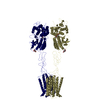 8jcuC 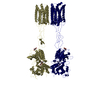 8jcvC  8jcwC  8jcxC 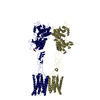 8jczC  8jd0C  8jd1C  8jd2C 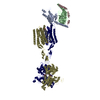 8jd3C 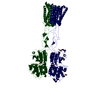 8jd4C 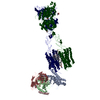 8jd5C 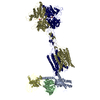 8jd6C M: map data used to model this data C: citing same article ( |
|---|---|
| Similar structure data | Similarity search - Function & homology  F&H Search F&H Search |
- Links
Links
- Assembly
Assembly
| Deposited unit | 
|
|---|---|
| 1 |
|
- Components
Components
| #1: Protein | Mass: 109398.914 Da / Num. of mol.: 1 Source method: isolated from a genetically manipulated source Source: (gene. exp.)  Homo sapiens (human) / Gene: GRM2, GPRC1B, MGLUR2, FKBP1A, FKBP1, FKBP12 Homo sapiens (human) / Gene: GRM2, GPRC1B, MGLUR2, FKBP1A, FKBP1, FKBP12Production host:  References: UniProt: Q14416, UniProt: P62942, peptidylprolyl isomerase | ||||||||
|---|---|---|---|---|---|---|---|---|---|
| #2: Protein | Mass: 112712.961 Da / Num. of mol.: 1 Source method: isolated from a genetically manipulated source Source: (gene. exp.)  Homo sapiens (human) / Gene: GRM3, GPRC1C, MGLUR3, MTOR Homo sapiens (human) / Gene: GRM3, GPRC1C, MGLUR3, MTORProduction host:  References: UniProt: Q14832, UniProt: A0A8V8TRG9, non-specific serine/threonine protein kinase | ||||||||
| #3: Sugar | | #4: Chemical | #5: Chemical | ChemComp-CLR / Has ligand of interest | Y | Has protein modification | Y | |
-Experimental details
-Experiment
| Experiment | Method: ELECTRON MICROSCOPY |
|---|---|
| EM experiment | Aggregation state: PARTICLE / 3D reconstruction method: single particle reconstruction |
- Sample preparation
Sample preparation
| Component | Name: mGlu2-3 heterodimer in presence of LY341495, NAM563, and LY2389575 Type: COMPLEX / Entity ID: #1-#2 / Source: MULTIPLE SOURCES |
|---|---|
| Source (natural) | Organism:  Homo sapiens (human) Homo sapiens (human) |
| Source (recombinant) | Organism:  |
| Buffer solution | pH: 7.5 |
| Specimen | Embedding applied: NO / Shadowing applied: NO / Staining applied: NO / Vitrification applied: YES |
| Vitrification | Cryogen name: ETHANE |
- Electron microscopy imaging
Electron microscopy imaging
| Experimental equipment |  Model: Titan Krios / Image courtesy: FEI Company |
|---|---|
| Microscopy | Model: FEI TITAN KRIOS |
| Electron gun | Electron source:  FIELD EMISSION GUN / Accelerating voltage: 300 kV / Illumination mode: SPOT SCAN FIELD EMISSION GUN / Accelerating voltage: 300 kV / Illumination mode: SPOT SCAN |
| Electron lens | Mode: BRIGHT FIELD / Nominal defocus max: 1500 nm / Nominal defocus min: 800 nm |
| Image recording | Electron dose: 70 e/Å2 / Film or detector model: GATAN K3 BIOQUANTUM (6k x 4k) |
- Processing
Processing
| CTF correction | Type: NONE | ||||||||||||||||||||||||
|---|---|---|---|---|---|---|---|---|---|---|---|---|---|---|---|---|---|---|---|---|---|---|---|---|---|
| 3D reconstruction | Resolution: 2.9 Å / Resolution method: FSC 0.143 CUT-OFF / Num. of particles: 1162068 / Symmetry type: POINT | ||||||||||||||||||||||||
| Refinement | Stereochemistry target values: GeoStd + Monomer Library + CDL v1.2 | ||||||||||||||||||||||||
| Displacement parameters | Biso mean: 31 Å2 | ||||||||||||||||||||||||
| Refine LS restraints |
|
 Movie
Movie Controller
Controller




















 PDBj
PDBj